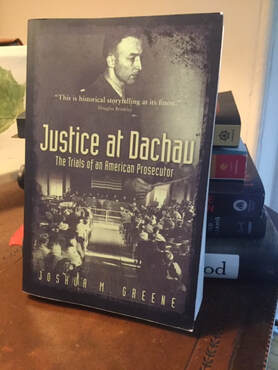
A year ago I walked onto the grounds of Dachau. It was my first visit to Germany and my first visit to a Nazi death camp. Soon after, I read Joshua M. Greene's brilliant Justice at Dachau, about the trial of Nazi war criminals held on the grounds of the Dachau camp in 1945-47. It's a fascinating story about a dignified man, William Denson, who sacrificed his health and nearly his sanity in leading the American prosecution team.
Denson employed a legal strategy called Common Design, which held that individuals who work within a destructive organization can be found guilty by virtue of displaying a shared, conscious intent to lend their services to that enterprise. I soon found myself wondering if Common Design could be applied to our present conundrum with climate change, in which millions of people work for enterprises that produce or emit large volumes of greenhouse gases. Many millions also engage in activities that enable our addictive dependence on fossil fuels.
Mankind's inability to boldly address the accelerating calamity of climate change starts, I think, with our inability to take responsibility for it. Might Common Design be useful here?
Denson employed a legal strategy called Common Design, which held that individuals who work within a destructive organization can be found guilty by virtue of displaying a shared, conscious intent to lend their services to that enterprise. I soon found myself wondering if Common Design could be applied to our present conundrum with climate change, in which millions of people work for enterprises that produce or emit large volumes of greenhouse gases. Many millions also engage in activities that enable our addictive dependence on fossil fuels.
Mankind's inability to boldly address the accelerating calamity of climate change starts, I think, with our inability to take responsibility for it. Might Common Design be useful here?
Nazi analogies are perilous, too easy to hurl about in these partisan times. But it's just as dangerous to assert that we no longer have anything to learn from the Nazi era. There are lessons from the great struggle with Nazism that still apply today. It's perfectly reasonable to argue that the legal strategy employed to prosecute men and women who carried out the Holocaust may also be effective for affixing responsibility, if just psychologically, for another disastrous event: climate change. If you're open to that possibility, please read my essay.
 RSS Feed
RSS Feed